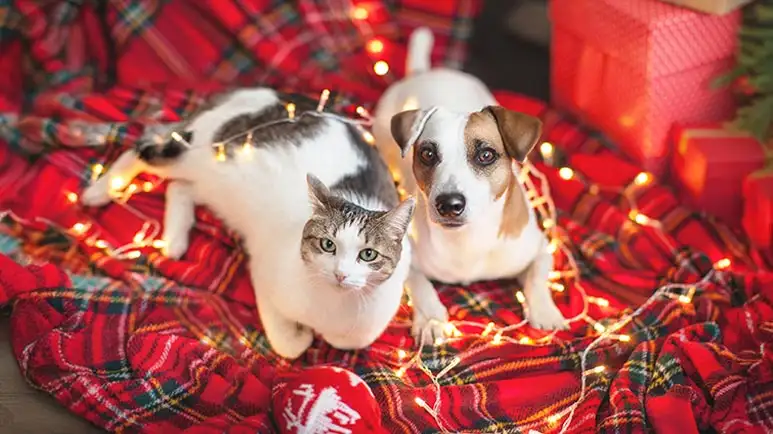Are Your Holiday Decorations Harming Your Pets?
Holiday festivities wouldn't be complete without beautiful decorations, but if you share your home with a pet, certain ornaments should be avoided. If these are in your home, get rid of them or keep them out of your pet’s reach.

STORY AT-A-GLANCE
- During holiday decorating, pet owners must be cautious about toxic plants like mistletoe, which can cause severe health issues or even death in dogs and cats if ingested
- Lilies are especially dangerous for cats, potentially causing severe kidney problems and symptoms like vomiting, lethargy, and changes in urination, even with minimal exposure to the plant
- Beyond toxic plants, holiday decorations such as candles, glass ornaments, and tinsel pose significant risks to pets, including potential fire hazards, injuries from broken glass, and digestive tract damage
- While poinsettias are commonly known as harmful, mistletoe is actually more toxic, with the potential to cause gastrointestinal upset, seizures, low blood pressure, and potentially fatal complications for pets
- Other hazardous holiday plants include Christmas tree needles, Christmas cactus, and Christmas rose, which can cause various symptoms like skin irritation, abnormal movements, vomiting, and potentially deadly reactions in pets
Many homeowners dedicate a lot of time to make their house look festive and homey for the holidays. There are many wonderful décor options out there, but nothing can make a place look lovelier and more alive than using fresh Christmastime plants.
But if you have pets at home, the situation becomes different, as you must carefully scrutinize every single décor you use. There are holiday plants that are particularly dangerous to pets and could lead to unpleasant side effects — some may even be fatal.
Mistletoe — More Toxic to Pets Than Poinsettia
Kissing under the mistletoe (Phoradendron flavescens),1 usually hung above the doorway, is a timeless Christmas tradition for many people, but be careful — this seemingly innocuous plant can be dangerous for your pet dogs and cats. In an article posted in Chewy, Carole Osborne, DVM, warns:
“There are some plants that absolutely can be a matter of life and death,” she adds. “Mistletoe berries are super toxic — they can cause a heart attack and even death.”2
When ingested, even in small amounts, mistletoe can lead to gastrointestinal upset, such as diarrhea, vomiting, drooling and abdominal pain. Large quantities, however, can be fatal, as this plant can cause seizures, low blood pressure, difficulty breathing and even death. As such, make sure to use only fake mistletoe made from materials like plastic or silk.3
In fact, many vets say that mistletoe is more toxic than poinsettias — the ultimate no-no décor that most pet parents are familiar with. However, while poinsettia does contain a poisonous, milky white sap that can lead to side effects like diarrhea, vomiting, irritation and drooling in pets, the effects are generally milder compared to what could happen when a pet ingests mistletoe.
“The truth of the matter is, most plants might make the animal drool or get a tummy ache or get a little diarrhea, but most plants are not fatal,” Dr. Osborne says.
All Types of Lilies Are Especially Harmful to Cats
Still, not all plants are equally toxic and harmful; while some are harmless and others can cause mild symptoms, and there are some that are particularly ill-advised to put in your home, whether during the holidays or all year round.
Lilies are one example. According to Tina Wismer, DVM, DABVT, DABT and medical director at the ASPCA Animal Poison Control Center, all parts of the lily plant, whether fresh or cut, are poisonous to pets.4
Cats, in particular, are very sensitive to lilies. Even Dr. Jerry Klein, the Chief Veterinary Officer of the American Kennel Club, says that “Homes with cats should never have lilies in them.”5 When they ingest the toxins, they can develop severe side effects such as lack of appetite, diarrhea, vomiting, lethargy and changes in urination. According to Chewy:
“Seek urgent veterinary care if you think your pet ingested even a tiny bit of a lily, touched the pollen, or drank water from a vase of lilies — especially for cats. Cats are very sensitive to kidney issues caused by ingesting toxins from lilies.”6
Other Popular Holiday Plants to Keep Away from Your Pet’s Reach
Although mistletoe, poinsettia and lilies are at the top of the list of holiday plants to avoid, there are a few more to be wary of. According to Klein, “Amaryllis, balsam, pine, cedar, and holly are among the common holiday plants that can be dangerous and, in some cases, even poisonous to pets who eat them.” A few more examples include:
- Christmas tree — Although not necessarily toxic to pets, ingesting the pine needles or tree sap can lead to gastrointestinal upset (vomiting, diarrhea and nausea). Coming in contact could also cause skin irritation.
- Christmas cactus (Schlumbergera bridgesii) — Chewing or ingesting the plant can cause mild diarrhea, vomiting and nausea. Some cats also experienced ataxia (abnormal, uncoordinated movements) after chewing it.
- Christmas rose (Helleborus niger) — Although it makes a pretty centerpiece, this plant contains toxic cardiac glycosides, saponins and protoanemonin, and can be deadly to both dogs and cats. Ingesting it can cause drooling, diarrhea, abdominal pain, vomiting and lethargy.
Beyond Plants — These Holiday Home Decors Items Can Also Pose a Hazard
Apart from toxic plants, there are some holiday decors that could pose dangers to your pets, especially if placed in an area where pets can easily access them. If you have these decors around your home, take extra caution to keep them from becoming a hazard to your pets:7
- Candles — Could lead to a fire hazard if accidentally tipped over.
- Glass ornaments and snow globes — They can break, and the glass shards can cause injury.
- Tinsel, popcorn garlands and ribbons — If ingested, tinsel and ribbons can damage a pet’s digestive tract. Meanwhile, popcorn garlands can be a choking hazard.











